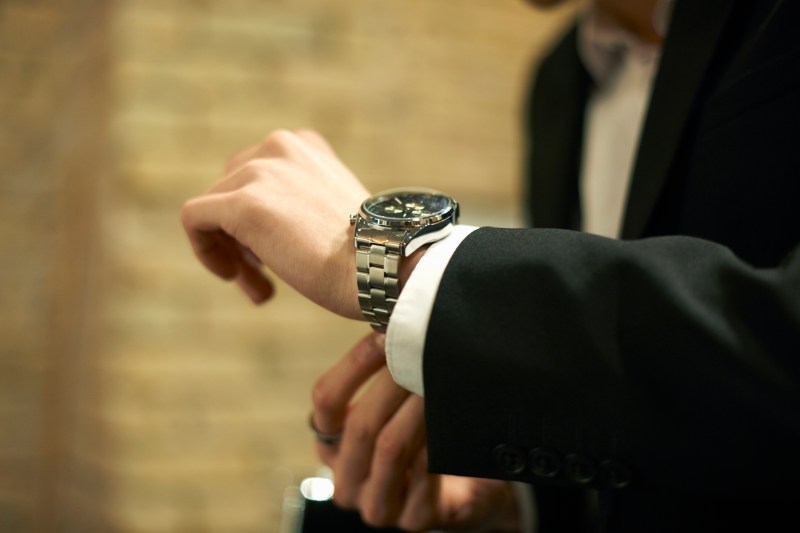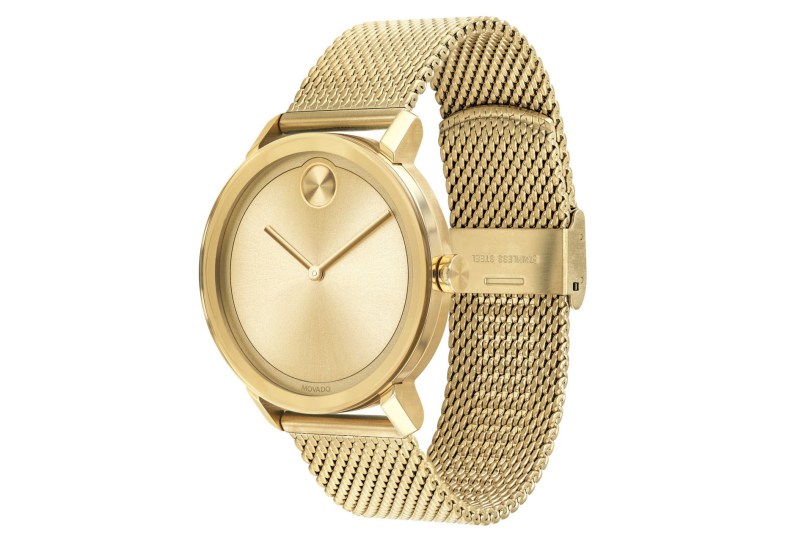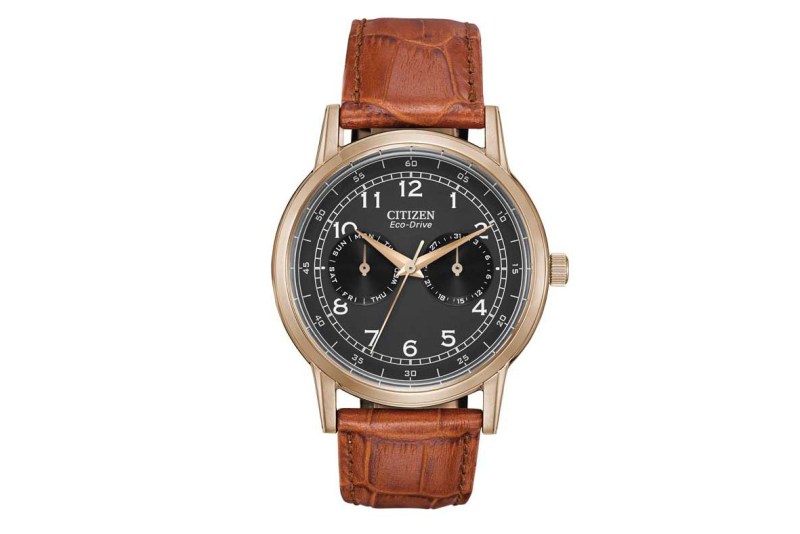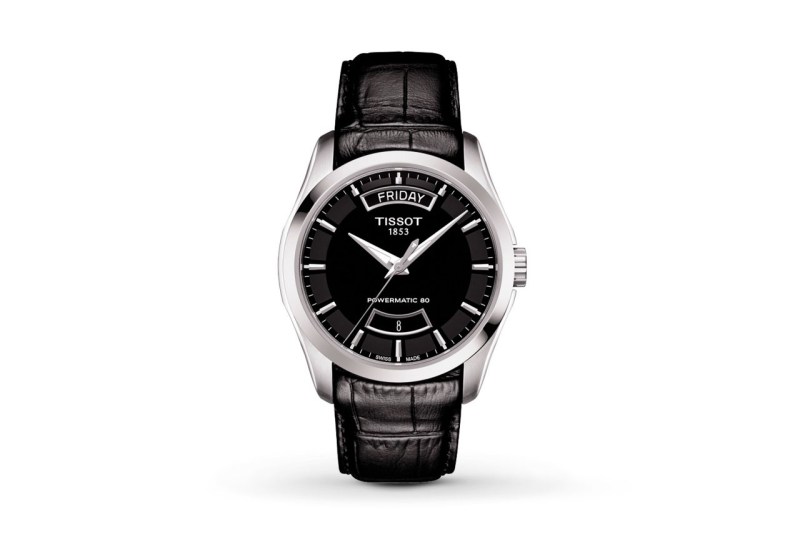
From Swatches to Timexes, FitBits to Rolexes, watches are one of the most effective ways men are able to express themselves. Whether your personal style is big and flashy, or quiet and tasteful, sooner or later your watch is going to get dirty. Since a watch isn’t like a pair of socks to be tossed in the laundry, we asked Brittany Childerson, the merchandising director of Signet (the parent company of major jewelry retailers Zales, Kay, Jared, and more) for her list of the dos and don’ts of watch care.
Related Guides
“Depending on how much you spend, a watch is an investment. Treat it like you want to have it as long as possible, and keep it in its best condition,” says Childerson. “Treat it like it’s an extension of your jewelry collection. First, there’s a difference between cleaning the outside of your watch and opening it. My advice is, just clean the outside.”
The best way to clean a watch is to not get it dirty in the first place.

Movado Bold Gold-Tone Mesh Watch
The Dos
Rely on a Professional
“Different watch types require different care and maintenance,” Childerson points out. “Citizen watches, for example, are solar-powered, so while they do have a battery inside, probably all you need to do to get it working is let it sit on your dashboard for a few hours.” (But see our note below about sunlight.)
“Quartz watches are powered by a battery, so will probably require more long-term maintenance. For $10 to $20, you can go to your jeweler and have them change the battery. Check with your jeweler upon purchase. Many offer extended warranties that include lifetime battery replacement.”
“Manual wind watches, on the other hand, only require actual winding, so they require little maintenance.
“Automatic watches should be checked out, on average, every five years. The jeweler will remove the movement, disassemble it, clean and re-grease all the friction points, then put it back together. Those steps will keep the integrity of all the gears in place, ensuring accurate timekeeping.”
Your watch will tell you when it needs attention. If you’ve cracked a crystal, you may see condensation under the glass or plastic. For automatics and manual wind watches, you may notice a grittier feel to the watch winding, which means that something is misaligned.
Store in a Cool Dry Place
Put your watches away, preferably in their original boxes to protect them from scratches. If you’re feeling a need to show off, “get a watch display case, or a winder if you’re into automatics,” says Childerson. “If you need to leave your watch out for some reason, make sure the crown is screwed down to prevent outside materials from getting into the movement. That can interfere with its timekeeping accuracy.”
Clean With a Dry, Clean Cloth
There’s always a possibility that your watch will end up wearing some of your lunch or otherwise getting soiled. “Generally speaking, you’re not going to need to deep-clean your watch. Hopefully, you’re not wearing it for paintball battles. Just like maintaining gold, a clean, dry, dust-free cloth can buff off most things,” instructs Childerson. “If the watch has a nylon strap, spot-treat it with a damp cloth.”
Tissot Couturier Automatic
Clean and Maintain Leather Bands
“Check with the manufacturer about how to clean and treat their particular leather. Tag Heuer is not going to have the same guidance as Citizen for their proprietary treatments and coatings.” As above, use a clean cloth to spot clean the watch, then apply a tiny amount of gentle dishwashing liquid or saddle soap and lightly clean the band. Wipe with a clean damp cloth, then, once it’s dried completely, condition with a leather conditioner.
The Don’ts
Don’t Shower With it or Submerge in Water (Even if it’s Waterproof)
Sure, a dive watch should be able to handle a few minutes in the shower, but what if you’ve been fidgeting with the crown and left it open? What if the gasket on the case back is compromised? “Introducing water into a watch’s movement can create rust in the movement, which is the heart of the watch,” Childerson warns. This can also cause leather straps to stain, discolor, or deteriorate more quickly (For instance, don’t use a hairdryer on it if you get caught in the rain. It can dry out the leather.)
Avoid Chemicals and Personal Care Products
“Don’t wear your watch in chlorinated water,” says Childerson, and avoid any harsh chemicals you may be using at work or at home. “Don’t clean while wearing your watch.”
On a similar bent, don’t wear your watch during your grooming routine. You’re not wearing it in the shower anyway, but avoid soaps, moisturizers, shaving products, and particularly spray deodorant or cologne. “Let that stuff soak in and dry before you put on your watch,” says Childerson. “My watch is the last thing I put on.”
Avoid Magnets
As noted above, sometimes gears can become misaligned, and that may be because you’ve come into contact with a powerful magnet. “These days we’re surrounded by them,” says Childerson, “from those in your phone to those used in the medical field. A lot of watch brands are getting better at protecting watches from magnets. but watch for the warning signs.”
Don’t Store in Direct Sun
This is particularly important if you have a watch with a leather or rubber strap, which is prone to age and dry out the material, creating cracks and tears.
Don’t Open the Back of the Watch
“Unless you are, yourself, an authorized repairman — with the proper credentials for that specific brand — the moment you open the back of the watch, you’ve voided the warranty. Furthermore, even if you could get it open with the usual tools you might have at home, you’re going to have a really hard time putting it back together. You’re going to end up having to run an errand either way, so why not just start off by doing the right thing and going directly to the jeweler?”

Citizen Eco-Drive Corso Rose-Tone Strap Watch
Fashion Versus Investment Watches
“All finishes are not created equal, and that will correlate with pricing” points out Childerson. “It’s a good-better-best scenario. A ‘good’ fashion watch is more likely to have plating over a base metal, usually stainless steel. Those platings, gold, rose gold, white gold, etc., will wear off over time as they are affected by oils on your skin, repetitive movements (like rubbing your wrist on a desk while typing all day), and general wear-and-tear. In most cases, though, people have the mindset that they like their watch now, and it fits their fashion needs for the moment, but they’re prepared to buy another one when they tire of it or fashions change.”
In the better category, a physical vapor disposition, or PVD finish forms a molecular bond between the outside coating and the base metal, so it’s not likely to scratch off over time, offering more longevity.
Finally, the best watches are those that are true gold pieces. They’re not going to change, but they are a softer metal and more likely to scratch. While you can have those buffed out, that also means you’re losing precious metal from the watch, so it may be worth living with any blemishes as added character. Better to take extra good care of it in the first place.



